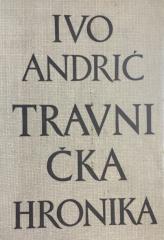Ivo Andrić
Ivo Andrić (October 9, 1892 – March 13, 1975) was a Croatian-Bosnian-Serbian writer and the only winner of the Nobel Prize in Literature from the former Yugoslavia (1961). He was born in Travnik and educated in Sarajevo, Zagreb, Vienna and Kraków. During World War I he was a political prisoner for sympathizing with Yugoslav unity. After the war he began a diplomatic career, working in various European capitals.
Andrić is best known for his novels and short stories that deal with the history and destiny of Bosnia and its people, often set in the Ottoman and Austro-Hungarian context. His most famous works are "Na Drini ćuprija", "Travnička hronika" and "Gospođica", which together form a kind of trilogy about Bosnian history and mentality. "Na Drini ćuprija", an epic novel about the centuries-old history of the city of Višegrad and its bridge, won him the Nobel Prize.
His style is calmly reflective, historically informed, and deeply humanistic, and his themes are often marked by reflections on evil, fate, suffering, and historical cycles.
Andrić left behind a rich body of essays, short stories, and novels, and his work continues to occupy an important place in the literature of Southeast Europe.
Naslovi u ponudi
Travnička hronika: Konsulska vremena
"The Travnik Chronicle" (1945) is a historical story set in Travnik from 1807 to 1814, during the Napoleonic Wars and Ottoman rule in Bosnia. Written during World War II, it is modeled after the European realist novel.
Travnička hronika : konzulska vremena
Travnička hronika (1945) is a historical novel written during the Second World War, modeled after the European realist novel.

